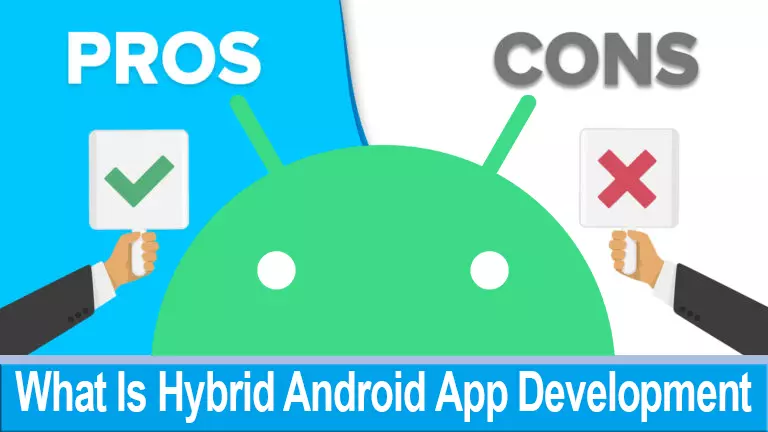When a dilemma arises regarding which types of the app should be developed, I suggest hybrid app development. But what is hybrid android app development? The hybrid application comes with web and native application features. Twitter, Gmail, Facebook, etc are examples of hybrid tools.
These sorts of tools can be installed from online platforms and viewed in browsers. Hybrid applications are not that type of effective as native apps, though. Still, the application has its users, popularity, and usability for many reasons.
Must Read: What Is Native Android App Development-Pros and Cons
5 Benefits Of Hybrid Android App Development

Hybrid apps have numerous advantages. Other apps like native or web apps might have positive sides, but those have negative sides too. The drawbacks of the other apps are the advantages of hybrid tools. A new company can think about making hybrid apps. So, the benefits of the hybrid tools are as follows:
1. One program language
Hybrid apps require only one program code to build such a tool. It doesn’t need multiple languages to develop. The main structure of creating hybrid apps are HTML, CSS, and JS. So, the developers don’t need to hassle. Even the developing process is faster than native or web apps.
2. Moderate-Level Budget
Developing a hybrid app needs a minimum budget. It can be called a budget-friendly app. All the building processing, maintenance, and update don’t require much money. It is more cost-effective than other applications. The medium-level companies can afford it easily.
3. Combination of web browser and Online platform
Hybrid application has both features of native and web apps. That’s why it is called a hybrid app. Users can view the app by browsing and online. It is also available on Apple Store or Play Store. So, it is comfortable for users any way they can have the app.
4. Easy and Time Effective
As it likely has web app features so the same developer can build the app. It doesn’t need an expert team to develop it. This is because it needs web technology to create it. Even the maintenance and upgrading policy is fast. It doesn’t waste valuable time like a native app.
5. Better Performance
Hybrid apps are upgrading, and new features are included. So, the performance is getting better than before. As it is competing with native and web apps. On the other hand, the speed of the app is moderate. Actually, it depends on the user’s browser speed.
Drawbacks Of Hybrid Android App
Apart from the various advantages of hybrid apps, it has disadvantages too. One should keep in mind both sides. That will help to understand whether one should spend money on a hybrid app or not. Here are the cons of the app below:

- The speed of the hybrid app loading is not so good. Even it cannot work offline.
- Hybrid apps are less secure than native apps. Hybrid tools have a thread of web attacks due to web views.
- The user interface is not that much more developed than native apps.
- It doesn’t have access to the user’s device’s camera, video, map, and other software.
- It cannot ensure a good utilizing experience for users.
- Difference Between Hybrid And Native Apps
Here is the basic difference between hybrid and native apps. Have a look at them below:
|
Hybrid App |
|
| A hybrid app is a combination of native and web applications. | A native app is a mobile software built for a particular platform. |
| The hybrid app is available both in the Play Store and the web browser. | The native app is available only either in Play Store or Apple Store. |
| Hybrid tools require one code language such as HTML, CSS, JS, etc. | Native apps build up with multiple programming languages such as Objective-C, Swift, Kotlin, etc. |
| Native apps are more popular and able to bring more traffic. | Hybrid apps are slow and not able to engage enough users sometimes. |
| Developing a Hybrid tool is cost-effective and doesn’t need lots of time. | Developing a Native app is expensive and requires lots of time and energy. |
| Hybrid tools cannot work offline. | Native apps can work offline. |
| It doesn’t have access to software like a camera, map contacts, etc. | It has access to a camera, map contacts, etc. |
When Should You Build A Hybrid App
Building a hybrid application is beneficial from various corners. When your budget is limited, you should go for hybrid apps. Even when a business is in the beginning stage, developing a hybrid tool is a good idea. The hybrid application has access to both the Play Store and the web Browser. It doesn’t require that much maintenance or updating.
Therefore, a company can make a hybrid application with beginner to medium developers. But to build a native app, you need an expert with good remuneration. Users of hybrid apps are fewer than native apps, but this app also has user engagement.
Final Thoughts
That’s all about hybrid app development. Hope that the users now know about what is hybrid app development. This application has so many advantages that anyone can invest in developing it. The traffic and engagement depend on exclusive services and features.

